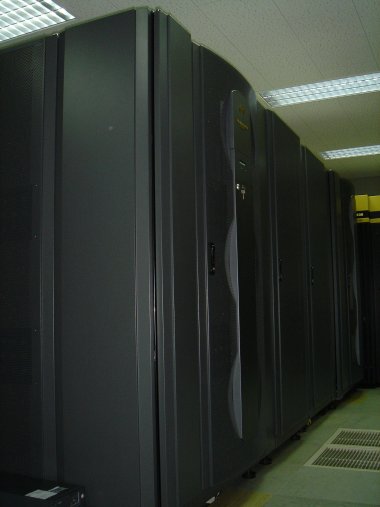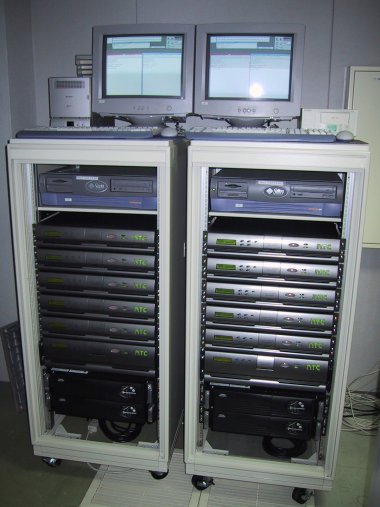
 Facilities of Cooperative Study Program: Facilities of Cooperative Study Program:
Advanced Kyoto-daigaku Denpa-kagaku Keisanki-jikken (A-KDK) computer
Overview
The A-KDK computing faciltiy is capable of large-scale computer experiments on radio science in our humanosphere. The A-KDK system consists of high-performance parallel machines known as AKDK1, AKDK2, AKDK3, and RAID disk array system. AKDK1 and AKDK2 are one-node systems used for large-scale parallel computation. AKDK1 has a shared main memory of 512 GBytes with 128 scalar processors and AKDK2 has 512 GBytes memory with 128 processors. AKDK3, which has 64 GBytes of memory with 16 processors, is used for program development/tuning, data analysis/visualization, and small-scale computer experiments. The RAID disk array system in AKDK has a capacity of 10 TBytes. An additional RAID disk system with a capacity of 15 TBytes and three-dimensional visualization software for parallel processing are also available for A-KDK users.

- AKDK1
PRIMEPOWER HPC2500 (Fujitsu)
1 node, 512 GB shared memory, 128 CPU (SPARC 64V)
- AKDK2
PRIMEPOWER 1500-s (Fujitsu)
1 node, 256 GB shared memory, 32 CPU (SPARC 64V)
- AKDK3
PRIMEPOWER 900 (Fujitsu)
1 node, 64 GB shared memory, 16 CPU (SPARC 64V)
- RAID disks
ETERNUS (Fujitsu) 10.4 TBytes
Fast Data Archive System (F-DAS)
Fast Data Archive System (F-DAS) consists of 12 RAID disks having the total amount of 12.4 TBytes, two workstations, and an AIT tape drive for data backup. It has been utilized to store the observation data with the MU data, the Equatorial Atmosphere Radar, GEOTAIL Plasma Wave Instrument etc.

Return to Top page | Department of Collaborative Research Programs.
|

